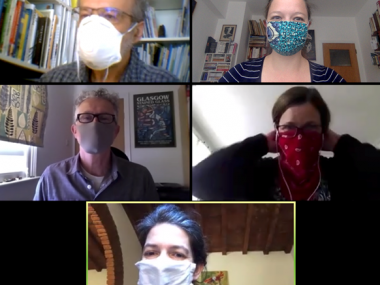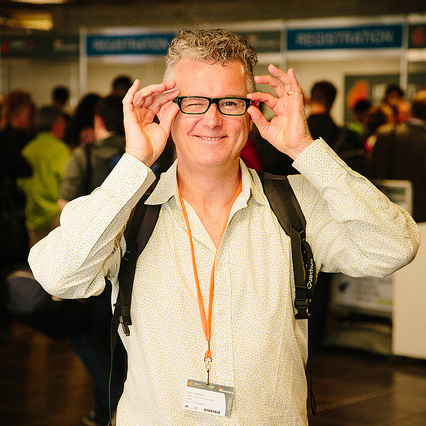New times, new tools
Edited on
06 August 2020Expert Eddy Adams reflects on the impact of Covid-19 on URBACT and transnational cooperation.

On a scale of 1-10, how much did you love the lockdown? Most likely, the responses will cluster around either end of the scale. In this age of extremes, love and hate trump the safe centre. Reactions to the pandemic are no different.
For many of us, the biggest lockdown shift has been to a work and social life largely on line. If you’re a city official, as well as working from home, this may have been compounded by redeployment to new tasks and uncertainty about what’s ahead. For many, the ‘New Normal’ will mean organisational disruption and budget cuts.
The implications of this are significant for URBACT – and for transnational cooperation more generally. URBACT provides space and resources for cities to collaborate across Europe. It offers a platform for mutual learning, skills exchange and the co-design of solutions. It also encourages frugal innovation and small-scale implementation. How will this working model look as we emerge from the dark tunnel of the pandemic?
It was great to be with all @URBACT(link is external) APN in a Zoom call with 90+ participants! We are preparing our engines for Phase 2 #foodcorridors(link is external) #urbact(link is external) pic.twitter.com/WcBuvHHnYO(link is external)
— FOOD CORRIDORS (@FoodCorridors) June 5, 2020(link is external)
It’s not all bad
Let’s start by focusing on the good stuff. The birds are singing, the air is cleaner and the pace of life is slower. Of course, there is the small matter of the economy, but for now, let’s enjoy the moment. For many, this is the world we wanted: fewer cars, fewer planes, and reduced industry emissions. Except, it’s just not how we planned to get there. This truly is a “be careful what you wish for” moment.
But the reality is that the status quo ante was never a sustainable option. If the key messages from the Paris Agreement(link is external) were not already enough, the EU Green Deal(link is external) underlined the tension between what we have to do and the way we were behaving. Even if we can return to our old lives, we have a duty to avoid doing that: a duty to the planet, to our communities and those who come after us.
What does that mean for URBACT’s transnational city networks? In the short term it means rethinking and rescheduling. As far as international travel is concerned, we can pretty much say arrivederci to 2020. For our 46 ongoing city networks, this involves lots of creative thinking around working methods. How can we sustain collaborative momentum without the scheduled physical meetings?
For the programme it has required some tough decisions like the cancellation of the URBACT Summer University (USU) in Dubrovnik. This unique capacity building event, gathering 500 URBACT practitioners from across Europe, provides the methodological foundations and the network cement for our Action Planning Networks.
But this is not the time to dwell on what we have lost. Like all moments of crisis, winners and losers will emerge from the rubble of this experience. Those who can apply the key lessons most effectively will be the biggest beneficiaries. For URBACT, the prize is to redefine the meaning of transnational cooperation in Europe in a way that’s more consistent with our environmental goals. If the COVID-19 experience teaches us anything, it must be the need to ruthlessly prioritise the planet’s needs over everything else.
The end of transnational cooperation as we know it?
This doesn’t mean the end of transnational cooperation amongst Europe’s cities. However, it should mean the end of countless publicly funded plane trips across the continent. At the same time, it doesn’t mark the end of face-to-face meetings. As humans, we need these personal connections, and cooperation is all about strong working relationships. A Zoom meeting with someone you have already met in real life, is a different proposition to exchanging with a stranger via a screen.
In the coming months – maybe years – we will be feeling our way towards whatever the new transnational cooperation model is. This is likely to be a blended approach which combines far fewer physical meetings with a growing number of online collaborative exchanges. Some people won’t like this; for example, those who enjoy the budget air travel experience. But many others will welcome this shift: people with disabilities and those with caring responsibilities amongst them.
How to make it happen?
If your new life is wall-to-wall online meetings with monotonous talking heads, then you’re probably fearing the worst. In reality, the successful future of transnational cooperation is contingent on our ability to do better than this. Much better.
On 4 and 5 June 2020, the APN kick-off online meeting for phase II gathered about 100 people from all across Europe. URBACT team redesigned the meeting for an online environment. This included shortening the sessions to focus on the essentials, allowing participants to float between one and up to 23 breakout virtual rooms, and even testing new online tools. Was this is a taster for what future cooperation could look like?
Overall, participants were positive about the meeting and the possibilities offered by digital technology. Fabiana, Lead Partner of Healthy Cities, said: “I prefer face-to-face meetings, but I’m getting used to this new situation.”
There was also a recognition that URBACT has a key catalytic role here. Patrizia, Lead Partner of Thriving Streets, said: “URBACT is very much about interactions, exchanges, sharing, relationships: it's not just a matter of using platforms, but also about social innovation, now taking into consideration the digital divide, responding to new ways we relate to each other, new ways of doing, organising and also thinking”.
Very well-organised kick-off meeting of phase 2 of our 23 #actionplanning(link is external) networks.
— Urban Energy Pact (@Urb_En_Pact) June 5, 2020(link is external)
Great to be part of the @urbact(link is external) community, looking forward to seeing all of you for the next city festival anywhere... @ClrmntMetropole(link is external) #bettercities(link is external) pic.twitter.com/fDWB3qTfqC(link is external)
Over the past ten years, the programme has carved out a reputation for applying the principles of participation and interactivity in its networks. Interventions like the Summer University have been vital in conveying this message and enabling city officials to put these principles into practice. In doing so, the programme has built strong trusted relationships in every corner of the continent – and with cities of all sizes. URBACT can now optimise these trusted networks to support the transition to the next generation of urban collaboration in Europe.
Yes, there are significant barriers to this: public authority reticence around digital platforms is one; lack of familiarity with the new tools is another. But these are not insurmountable.
What do you know…the tools were there all along
The digital platforms and tools are already in place. Indeed they have been there for some time, but until recently we have chosen not to embrace them. Instead, we have jumped on planes and, at best, employed digital tools as no more than visual telephones. This is our big ‘aha’ moment, as we realise that the growing repertoire of digital products allows us to do almost everything we do in physical meetings – and more.
URBACT is already in the vanguard of driving this shift. The programme is designing a range of resources to support its networks to optimise digital tools for collaboration. This includes diagnostic research into the growing range of platforms and tools. It also involves research into the competencies required to design and facilitate successful online events. For URBACT, that means sessions with clear objectives that are well managed, highly participative – and also enjoyable.
We won’t pretend we are there yet. This remains work in progress. The redesign of the Summer University as a digital experience and our forthcoming online toolbox are important components of this. So too, are the programme resources to support and build capacity for online facilitation. We are in the foothills of the long climb ahead of us.
What is important however, is that we recognise that going back is not an option. Framed positively, this crisis has helped show the way ahead, not only in terms of a short-term response to the pandemic. The message is clear: we must reshape our working model if it is to be sustainable, and consistent with the policy priorities set out in the European Green Deal. Cities of Europe, are you with us?
 Submitted by Eddy Adams on
Submitted by Eddy Adams on




